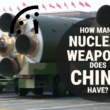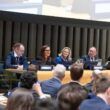The time is now
By Martin B. Malin, August 5, 2013
In Round Two, Ayman Khalil asked his fellow authors to weigh in on whether the effort to create a WMD-free zone in the Middle East is dead. My answer is this: The effort will continue, but the opportunity presented by the 2010 Review Conference for the Nuclear Non-Proliferation Treaty (NPT) may be slipping out of reach.
Ambassador Wael al-Assad, who coordinates the arms control and disarmament positions of Arab League members, points out that states in the Middle East have only three options for responding to WMD threats: acquiescence, counterbalancing, or region-wide WMD elimination. The incentive to pursue a regional ban on WMDs will strengthen, I believe, because the alternatives are becoming ever more costly and dangerous. This is not only true for Iran and the Arab states but also for Israel, whose regional monopoly on nuclear capabilities is eroding.
But that doesn’t mean leaders will work together to eliminate WMD from the region any time soon. Instead, fear may drive them to continue counterbalancing perceived threats with new capabilities of their own, which will only lead to deterioration in their security positions, even as their neighbors’ security positions also deteriorate.
So how might nations in the region avoid this Middle Eastern version of "Thucydides’ trap?" My colleagues have proposed several reasonable approaches. These include Salsabili’s notion of building up to the establishment of a region-wide WMD-free zone by organizing subregional enclaves first; Khalil’s proposal for developing regional verification measures through technical cooperation; and Eiran’s suggestion that states exchange and discuss national threat assessments. All of my colleagues have also endorsed greater involvement by nongovernmental organizations, and I have suggested establishing a regional security forum, which could host the kinds of discussions envisioned in each of the proposals above.
These ideas are constructive and doable. Implementing them would not require regional consensus. None of the ideas would necessarily interfere with the convening of a Helsinki conference along the lines envisioned by the NPT review conference. But—and I hope my colleagues will forgive me—neither they nor I have proposed anything new.
Governments in the region have squandered opportunities for discussion of arms control and disarmament before, and it hasn’t been for lack of viable proposals about how to move the process forward. Why all the squandering?
When I talk to Arab and Iranian colleagues, I often hear that Israel would exploit confidence-building measures to avoid the core issue: Israel’s nuclear arsenal. They point to the post-1991 Israeli-Palestinian "peace process" as an example of an initiative that failed because of dead-end incrementalism and endless Israeli delaying tactics. Why make the same mistakes, they ask, when addressing nuclear, biological, and chemical weapons? They have a point.
When I talk to Israelis, they say they are prepared to meet with their neighbors but that their neighbors are only interested in bashing Israel’s nuclear capability to score rhetorical points in international fora. Israelis say that if their neighbors were really interested in arms control, they wouldn’t, for example, make speeches critical of Israel at NPT preparatory meetings at which Israel is not in attendance. Rather, they would pick up the phone. The Israelis have a point too.
Meanwhile, opportunities slip away, frustrations mount, confidence in the nonproliferation regime frays, and counterbalancing strategies become more ominous.
To prevent the current WMD initiative from sinking deeper into a coma (to use Khalil’s characterization), regional parties need to engage in direct, ongoing consultations—and a meeting in Helsinki needs to be organized this year. The United Nations needs to sponsor the process—and a regional forum that goes beyond the NPT’s purview needs to be established. Nations need to engage on core arms control issues—and conductbroader discussions about regional security.
If the political upheaval in the region teaches us anything, it is that weapons may turn out to have longer lives than the regimes that acquire them. The WMD problem in the Middle East must not wait until the time is right. The right time to begin is now.
Topics: Nuclear Weapons
Share: [addthis tool="addthis_inline_share_toolbox"]














